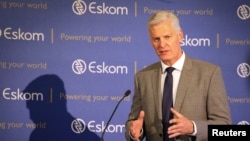The head of South Africa's embattled state power company, Eskom, is leaving his job earlier than planned, after accusing high level officials of corruption. The CEO's departure came the same day South Africa's finance minister announced a massive bailout for the debt-ridden company amid record power cuts.
Eskom’s CEO, Andre de Ruyter, has been "released" from his job "with immediate effect," the company said Thursday in a statement.
De Ruyter submitted his resignation late last year, saying he was unable to turn the graft-riddled utility around. Shortly afterward, he alleged there was a poisoning attempt on his life.
However, he had been set to serve out his notice period until the end of March and a replacement has not yet been found.
News of his early departure came shortly after de Ruyter gave an explosive interview on local TV this week accusing high level cabinet officials of being aware of and accepting corruption.
Eskom spokesman Sikonathi Mantshantsha said the board had convened a special meeting on Wednesday during which it was mutually agreed to curtail his notice period.
“The board further resolved that Mr. de Ruyter will not be required to serve the balance of his notice period but that he will be released from his position with immediate effect,” he said.
Earlier this month, South African President Cyril Ramaphosa declared a national state of disaster because of the electricity crisis.
The power cuts, known as “loadshedding,” are meant to reduce pressure on the overstretched grid, with its many aging and badly maintained coal-fired power stations regularly breaking down.
Sometimes running for as long as 12 hours a day, the blackouts have hit Africa’s most industrialized economy hard, said Finance Minister Enoch Godongwana in his budget speech Wednesday.
He then announced a large bailout for the company, which is $23 billion in debt.
“The lack of reliable electricity supply is the biggest economic constraint,” he said. “Record levels of load shedding were experienced in 2022. I’m told 207 days of load shedding.”
Lumkile Mondi, an economics lecturer at Johannesburg’s Witwatersrand University, told VOA the debt relief was a good move on the government’s part.
“The taking of the debt into the nation’s balance sheet allows Eskom to use that money wisely, invest on new transmission infrastructure, while at the same time having money to sustain some of the viable coal fired power stations, so I think overall it is positive,” he said.
Independent analyst Asanda Ngoasheng noted the current crisis stems from a myriad of factors. During apartheid only a small percentage of the population, mainly whites, had access to electricity, so when South Africa transitioned to democracy the new government had to roll out power to the rest of the population.
“It was essentially a heady cocktail of ailing infrastructure that wasn’t maintained, infrastructure that had to serve more people than what it had to serve before, and corruption, which then kind of made things worse than they already were,” she said.
De Ruyter was Eskom’s 13th CEO in 10 years. The company has said it is seeking a replacement.




